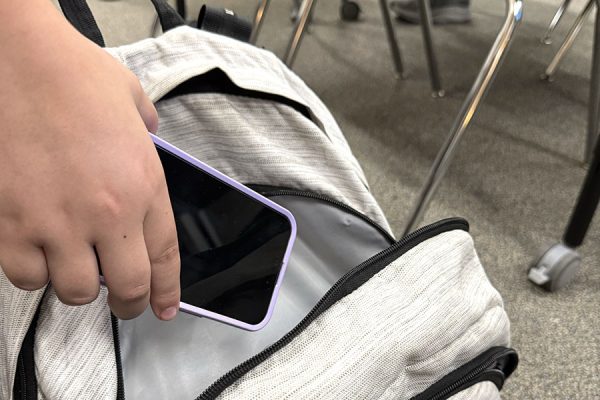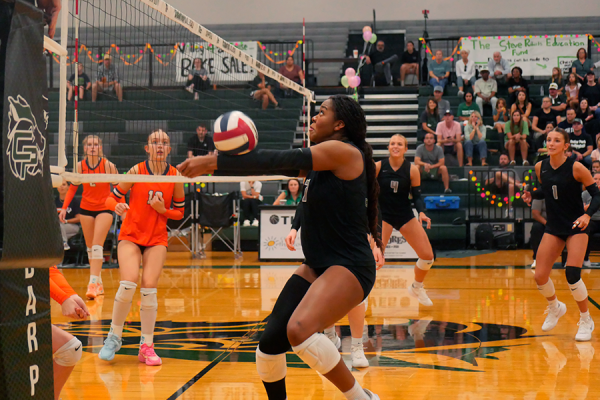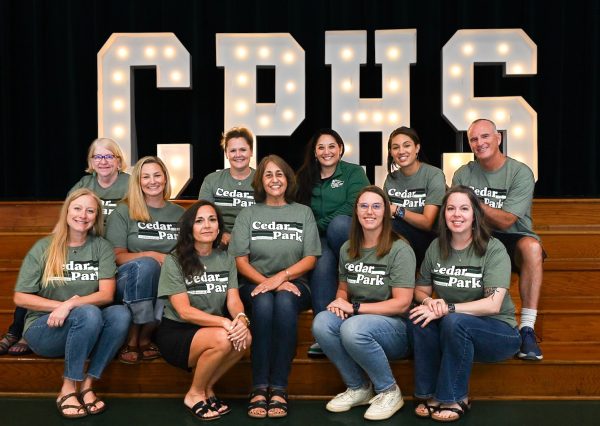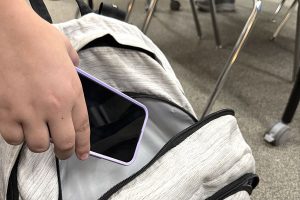The future of education: online classes
Sophomore Brandon Hurley works in his BIM class. This class has been teaching the students business courses electronically. “I feel like I am being prepared,” he said.
October 2, 2014
Technology has spread throughout America and is in most people’s day-to-day life, even in public schools.
Business Information Manager teacher Ladonna Handcox has recently put her classes online, supporting the idea that technology can contribute to education instead of hinder it. She did not start the online classes because she need drastic improvement; rather, she expected it was simply best for her students.
“The courses went online so that students would receive real-life experience in the subjects,” Handcox said. “Students leave these classes fully prepared for an office job and/or college.”
Overall, the students agree with Handcox that the untraditional course works just as well as traditional classes, if not more in some regards.
Senior Claire Rhine agrees with her teacher about the course’s efficiency.
“I like doing stuff on the computer more than paperwork,” Rhine said.
Sophomore Skyler Daly agrees with his teacher that one of the course’s main highlights is its efficiency.
“I feel like I am being prepared for certain jobs in the office through this class,” Daly said. “This class is very efficient.”
While the courses may use online instruction, Handcox is still the classes’ teacher.
“The courses are fully integrated; that is, the instruction, the practice, and the grading are all done online,” Handcox said. “As the teacher I am still teaching the subjects as I did previously, but my teaching is enhanced and supported by the online instruction.”
While traditional classrooms are more common, Handcox is not the only supporter of the online classes; the school district is beginning to see the benefits of working online, and demonstrates its support through funding.
“Each online course uses a specific program purchased by the school district for our use,” Handcox said. “There is no cost to the student.”
In addition to being good preparation for the future, online courses are overall more efficient, according to Handcox.
“The efficiency of online courses is the best feature,” Handcox said. “Students no longer have to wait for a teacher to evaluate their work and find their problem areas; the online program provides immediate feedback and grading, allowing the student to know right away if they have made a mistake and how to correct it.”
Overall, Handcox asserts that the online courses so far have demonstrated the ability to help students succeed.
“I definitely prefer [them]; I have seen that the students are learning more information in a shorter amount of time, and even making better grades,” Handcox said. “While I am sure that there are some classes that would not work well online, I feel that this is the wave of the future.”



![Jumping off the ground, senior linebacker Bennett Patton snatches the ball out of the air for an interception at Thursday’s game against Chaparral. Patton had two interceptions in the 56-14 victory, tying the school record for interceptions in a game. “I was just playing the game,” Patton said. “[I’m] going to go into next week, forget about it and stay humble.” Photo by Harper Chapman](https://cphswolfpack.com/wp-content/uploads/2025/09/bennett-interception.jpg)
![The fire department came to the school after students were evacuated when smoke started coming from the ceiling of a classroom. All students and staff are safe. “All of my friends left their stuff too, so we couldn’t contact our parents, and it was stressful,” senior Brynn Fowler said. “It was scary because I didn’t know [what was going on], and I couldn’t find anyone because it was a big crowd.” Photo by Anthony Garcia](https://cphswolfpack.com/wp-content/uploads/2025/09/firetruck.jpg)


![Sitting with her friend senior Sohpia Struve at last year’s Austin City Limits Festival, senior Ava Zuniga poses for a picture under a pavilion. They are frequent attendees at ACL, an annual music festival at Zilker Park. “I would recommend seeing a bunch of people,” Zuniga said. “This past year, we camped out for Chappell [Roan] for a really long time. I think the whole point of ACL, [which] is a lot of fun, is that you can go see so many different people, even if you don’t know them. So by camping by one person, it really limits yourself from being able to go see a bunch of people.” Photo courtesy of Ava Zuniga](https://cphswolfpack.com/wp-content/uploads/2025/10/EE9E9484-FE6F-4AA0-B5F5-0C177AB32841-1200x857.jpeg)
![Broadcast, yearbook and newspaper combined for 66 Interscholastic League Press Conference awards this year. Yearbook won 43, newspaper won 14 and broadcast took home nine. “I think [the ILPC awards] are a great way to give the kids some acknowledgement for all of their hard work,” newspaper and yearbook adviser Paige Hert said. “They typically spend the year covering everyone else’s big moments, so it’s really cool for them to be celebrated so many times and in so many different ways.”](https://cphswolfpack.com/wp-content/uploads/2025/05/edited-ILPC.jpg)




![Looking down at his racket, junior Hasun Nguyen hits the green tennis ball. Hasun has played tennis since he was 9 years old, and he is on the varsity team. "I feel like it’s not really appreciated in America as much, but [tennis] is a really competitive and mentally challenging sport,” Nguyen said. “I’m really level-headed and can keep my cool during a match, and that helps me play a bit better under pressure.” Photo by Kyra Cox](https://cphswolfpack.com/wp-content/uploads/2025/09/hasun.jpg)


![Bringing her arm over her head and taking a quick breath, junior Lauren Lucas swims the final laps of the 500 freestyle at the regionals swimming competition on date. Lucas broke the school’s 18-year-old record for the 500 freestyle at regionals and again at state with a time of 4:58.63. “I’d had my eye on that 500 record since my freshman year, so I was really excited to see if I could get it at regionals or districts,” Lucas said. “ State is always a really fun experience and medaling for the first time was really great. It was a very very tight race, [so] I was a bit surprised [that I medaled]. [There were] a lot of fast girls at the meet in general, [and] it was like a dogfight back and forth, back and forth.” Photo by Kaydence Wilkinson](https://cphswolfpack.com/wp-content/uploads/2025/03/Kaydence-2.7-23-edit-2.jpg)
![As the support team sits and poses for a photo in the cafeteria with the counseling team they eagerly wait to start their day. "We [all] seem to be a team, I get up every day and there's days where I don't want to go to work today, but I'm thankful that I have a job and I'm blessed to have what I have," Christopherson said. Photo Courtesy of Julie Weltens.](https://cphswolfpack.com/wp-content/uploads/2025/01/AF9E8470-10D7-4C91-BF28-EC8F86BAB66C-1200x852.jpeg)
![Officer Stephanie Cash is in her second year as an SRO at CPHS. “Seeing [students] grow over the years has been kind of cool,” Officer Cash said. “Freshmen that [are] all over the place and then in the next couple of years get a little more squared away and go to class and do work and start thinking about the future. Being a part of a student's growth is the best way to measure my success as an SRO.” Photo Courtesy of Cedar Park Police Department's PIO, Alicia Gallagher.](https://cphswolfpack.com/wp-content/uploads/2024/12/CPHS-SRO-900x1200.jpg)
![As he sprints with the ball, senior running back Trae Hill breaks a tackle during Friday’s 35-14 loss against the Vandegrift Vipers. Hill ran for 135 yards and two touchdowns during the game. “[Scoring] was electric,” Hill said. “It always feels good to score, but the O-line did everything.”](https://cphswolfpack.com/wp-content/uploads/2025/09/IMG_0795allie.varfb_-1200x799.jpg)


























![The fire department came to the school after students were evacuated when smoke started coming from the ceiling of a classroom. All students and staff are safe. “All of my friends left their stuff too, so we couldn’t contact our parents, and it was stressful,” senior Brynn Fowler said. “It was scary because I didn’t know [what was going on], and I couldn’t find anyone because it was a big crowd.” Photo by Anthony Garcia](https://cphswolfpack.com/wp-content/uploads/2025/09/firetruck-300x200.jpg)

![Finishing her night out after attending a local concert, senior Grace Sauers smiles at the camera. She recently started a business, PrettySick, that takes photos as well as sells merch at local concert venues. Next year, she will attend Columbia Chicago College majoring in Graphic Design. “There's such a good communal scene because there [are] great venues in Austin,” Sauers said. “I'm gonna miss it in Austin, but I do know Chicago is good, it's not like I'm going to the middle of nowhere. I just have to find my footing again.” Photo Courtesy of Grace Sauers.](https://cphswolfpack.com/wp-content/uploads/2025/04/Grace-300x225.png)


